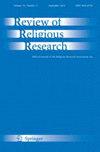Religious Disaffiliation From Orthodox Judaism: Social, Psychological, and Intellectual Factors Related to Exiting
IF 1.7
1区 哲学
0 RELIGION
引用次数: 0
Abstract
Studies investigating disaffiliation from Orthodox Judaism typically utilize samples composed of disaffiliated individuals, without a comparison group of affiliated individuals for reference. This research investigation measured 21 social, psychological, and intellectual experiences in disaffiliated and affiliated Orthodox Jewish individuals primarily in the United States to determine which factors were predictive of disaffiliation, a type of religious change. Experiences were measured with Yes/No questions and a Likert rating scale to indicate the extent to which respondents believed each factor contributed to their disaffiliation. Participants were 730 individuals who grew up practicing Orthodox Judaism and had either stopped or continued practicing (disaffiliated N = 387; affiliated N = 343). Based on regression analysis, factors predictive of disaffiliation were: (1) emotional abuse, (2) feelings that Orthodoxy is restrictive, (3) diagnosis of/treatment for a psychological disorder, (4) poor secular education in school, and (5) intellectual conflicts regarding Orthodox Judaism or questioning God. When rating each factor’s contribution to their disaffiliation, exiters most frequently reported moral or social conflicts with Orthodox Judaism, intellectual conflicts regarding Orthodox Judaism or questioning God, and feelings that Orthodoxy is restrictive. These findings contribute to a more nuanced understanding of religious exiting and draw out the factors uniquely predictive of disaffiliation in this population.脱离正统犹太教:与退出有关的社会、心理和智力因素
调查脱离东正教犹太教的研究通常使用脱离东正教犹太教的个人组成的样本,而不使用与东正教犹太教有联系的个人组成的对比组作为参考。这项研究调查测量了主要在美国的脱离东正教和加入东正教的犹太人的 21 种社会、心理和思想经历,以确定哪些因素可以预测脱离东正教这种宗教变化。这些经历通过是/否问题和李克特评分量表来衡量,以表明受访者认为每个因素在多大程度上导致了他们脱离正统犹太教。参与者包括 730 名从小信奉东正教犹太教的人,他们或停止或继续信奉东正教犹太教(脱离东正教的人数=387;信奉东正教的人数=343)。根据回归分析,预测脱离犹太教的因素有(1)情感虐待,(2)认为东正教具有限制性,(3)被诊断出患有心理障碍或接受过心理障碍治疗,(4)在学校接受的世俗教育较差,以及(5)在东正教犹太教或质疑上帝方面存在思想冲突。在评定每个因素对他们脱离东正教的影响时,脱离者最常报告的是与东正教犹太教在道德或社会方面的冲突、与东正教犹太教或质疑上帝有关的思想冲突以及认为东正教具有限制性的感觉。这些发现有助于人们更细致地了解宗教退出问题,并指出了在这一人群中可预测宗教脱离的独特因素。
本文章由计算机程序翻译,如有差异,请以英文原文为准。
求助全文
约1分钟内获得全文
求助全文
来源期刊

Review of Religious Research
Multiple-
CiteScore
2.50
自引率
20.00%
发文量
31
期刊介绍:
The Review of Religious Research (RRR) publishes empirical social science research on religion, primarily in sociology and social psychology and related fields of psychology, and scholarly literature reviews of research in these fields. RRR provides a forum for research across multiple disciplines and approaches, including research on the following topical areas: Clergy; Church programs; Comparative analyses of religious denominations and institutions; Denominational and congregational growth, decline, and vitality; Denominational and congregational conflict, competition, and cooperation; Ethnicity/race and religion; Generational and personal religious change; New religious movements; Personal spiritual and religious beliefs and practices; Religion and attitudes; Religion and family; Religion and gender, Religion and social behavior; Religion and well-being; and Research methodology. Among the characteristics that distinguish RRR from other academic journals on the study of religion are its applied focus and the opportunities it offers for academics and denomination-based researchers to share their findings with each other. RRR aims to facilitate the sharing and comparing of applied studies between denominational and academic researchers. RRR is the official quarterly journal of the Religious Research Association, Inc. RRR regularly publishes Original Articles, Research Notes, Review Articles, Applied Research Abstracts, and Book Reviews, and occasionally publishes articles on the Context of Religious Research. Applied Research Abstracts: This type of publication (previously called Denominational Research Reports) consists of a 350-550 word summary (without any references) of an applied research study in the form of a structured abstract, with the following section headings: Background, Purpose, Methods, Results, and Conclusions and Implications, followed by 3-4 keywords. The author may included a footnote that states: (a) whether a complete report exists and how it can be obtained; (b) whether the raw data are available in electronic form and how they can be obtained if the authors wish to make them available to other researchers; and (c) whether the authors would like to collaborate with other researchers to further analyze the data and write a full report for possible journal publication as a peer-reviewed manuscript. Such abstracts should be submitted to the journal editor for consideration for publication. Book Reviews: Unsolicited book reviews are not accepted for publication in RRR. If you would like to review a book for the journal, contact the Book Review Editor, David Eagle, Ph.D. – david.eagle@duke.edu Context of Religious Research: This journal heading covers items about awards and announcements, memoriams, and articles about the research process (e.g., articles on research methods and statistics, and profiles of denominational research organizations), as well as invited addresses to the Religious Research Association. Unsolicited articles should be submitted to the journal editor for consideration for publication. Original Articles: These are scholarly and methodologically sophisticated research studies: see Information for Authors on this website and the Submission Guidelines on the Springer RRR website for details (https://www.springer.com/13644) Reseach Notes: These are scholarly and methodologically sophisticated research studies: see Information for Authors on this website and the Submission Guidelines on the Springer RRR website for details (https://www.springer.com/13644) Review Articles: Authors should send an email to the journal’s editor describing the nature and scope of a proposed literature review to see if it is suitable for publication in RRR. See Information for Authors on this website and the Submission Guidelines on the Springer RRR website for details (https://www.springer.com/13644) The journal’s editor is Kevin J. Flannelly, Ph.D. – kjflannelly@gmail.com
 求助内容:
求助内容: 应助结果提醒方式:
应助结果提醒方式:


